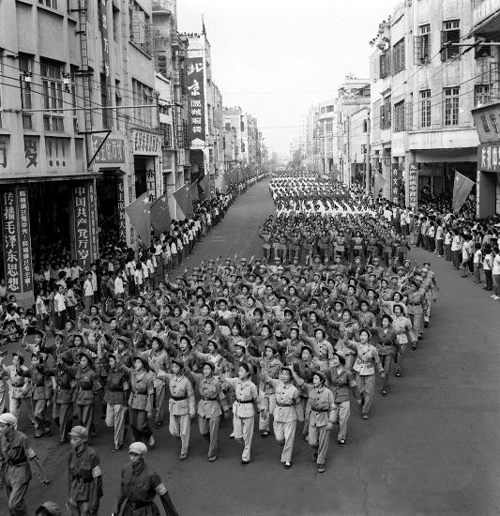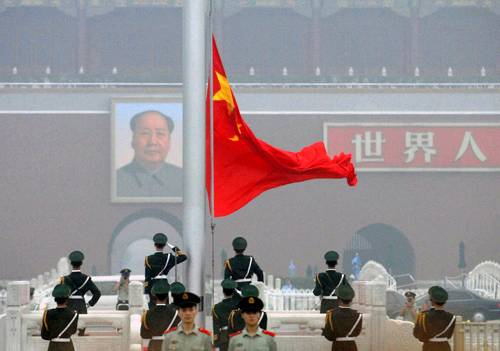Why and How the CPC Works in China
 0 Comment(s)
0 Comment(s) Print
Print E-mail
China.org.cn, October 27, 2011
E-mail
China.org.cn, October 27, 2011
Two different worlds
The recovery of the national economy was closely linked to the building of a new society. In the old society, the poor had no way to right the wrongs done to them or vent their grievances. In this regard, the CPC did a lot of work building a good social environment for the restoration of the economy.
In China women are said to "hold up half the sky." But in the old society male supremacy was the norm. As the Song of Women's Freedom, which was very popular at the time the PRC was founded, went, "The old society was like a dark well of bitterness, at the bottom of which we common people were weighed down, and women were the very bottom layer." The feudal marriage system, which had the main features of arranged and coerced marriages, men's superiority to women, and neglect of the interests of offspring, was an important reason for the untold trials and tribulations suffered by women in old China.
The Common Program, which was promulgated on the eve of the founding of New China, clearly stated: "The People's Republic of China shall abolish the feudal system which holds women in bondage. Women shall enjoy equal rights with men in political, economic, cultural, educational and social life. Freedom of marriage for men and women shall be put into effect." It also stipulated "the protection of mothers and babies, and children's health."
However, the feudal marriage system had not been completely eradicated, and arranged marriages, mercenary marriages, child brides, early marriages, abuse of women and some other feudal habits were still widespread. In order to abolish such evils, on May 1, 1950 the Central People's Government promulgated the Marriage Law of the People's Republic of China. As the first law enacted and implemented by New China, the implementation of the Marriage Law played a major role in China's social transformation. It stabilized marriages in the new system of freedom of marriage, monogamy, equality between men and women, and protection of the lawful rights and interests of women and offspring. After enactment of the Marriage Law, a large-scale movement was carried out nationwide to put the Marriage Law into effect. Publicity teams went into every street, village and home, explaining the essence of the Marriage Law, and telling women that they were now free.
In the early days of New China, the prostitution system left over from the old society was still endangering the physical and mental health of women, social stability and order, making it one of the most serious social problems. On November 21, 1949 the Second People's Conference of Beijing made the "Resolution on the Closure of Brothels." After the passing of the resolution, within 12 hours, 224 brothels were closed down, and 1,288 prostitutes were taken into care. Then, measures were taken around the country in succession to close down brothels, shelter and reeducate prostitutes to help them with the treatment of sexually transmitted diseases, and teach them trades so that they could become self-reliant workers and go back to the community. In just a few years' time the CPC completely eradicated the ugly social phenomenon of prostitution, and a large number of unfortunate prostitutes were given a new life.
Opium abuse was a very common social evil left over from old China. In the early days of the PRC, there were about 20 million drug addicts throughout the country, accounting for 4.4 percent of the total population at that time, which meant there was one opium addict for every 25 people.
In order to completely eradicate the scourge of opium abuse, the CPC launched an anti-opium campaign nationwide. On February 24, 1950 the Government Administration Council promulgated the Order on Prohibiting Opium, stipulating that in the regions where military operations had completely finished, the planting of poppies should be totally prohibited from the spring of 1950; in the regions where military operations had not yet been completed, the planting of poppies should be totally prohibited immediately as soon as the military operations were finished. No trafficking in or selling of crude opium or other drugs were allowed nationwide effective from the date of the issue of the prohibition.
Any violator would be seriously punished in addition to the confiscation of the contraband narcotics. Drug addicts should register within a prescribed time and give up addiction by a time limit. Those who failed to register or give up addiction before the deadline would be punished. In accordance with the requirements of this order, all local governments enacted and promulgated appropriate methods of implementation. The implementation of these regional laws and regulations ensured the smooth implementation of the work of narcotic drug eradication.
Soon after coming to power, the CPC swiftly eliminated various social evils, including the oppression of women, prostitution, and rampant opium abuse. These were all problems that had grieved the people but failed to be solved during the reign of the KMT. As a result, people felt that they were living in a completely new world.
By the end of 1952, China's industrial and agricultural output had grown by 77.5 percent as compared with that of 1949, and 20 percent higher than the record level in 1936, of which industrial output increased by 145.1 percent, and agricultural output by 53.5 percent. Industrial and agricultural output of major products all surpassed the highest level in history.
Based on the recovery and development of industry and agriculture, state revenue not only achieved a balance, but had a slight surplus. Not only were the needs of war and price stability ensured, but a major investment in construction began. The improvement of the people's living standards was obvious to all. In 1952 the average wages of workers in all regions increased by 60 percent to 120 percent compared to 1949, and was higher than the level before the Anti-Japanese War. The Chinese people, who had been subjected to endless insults and humiliations for over 100 years, not only felt stability in everyday life, but also entertained hope for the future. All this was realized without precedent. The Chinese people could see that the CPC was not only capable of leading them in smashing the old world, but also capable of leading them to build a new China.






Go to Forum >>0 Comment(s)